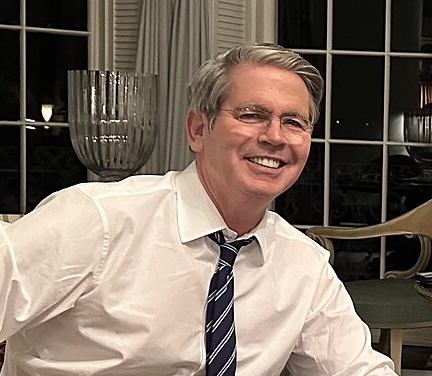Bessent spoke before the Senate Finance Committee about his economic vision for America, addressing key issues like tax policy, inflation and wealth inequality.
Asher Boiskin
10:10 pm, Jan 16, 2025
Contributing Reporter

Senator Tim Scott via Wikimedia Commons
If confirmed by the Senate, Bessent will succeed Janet Yellen GRD ’71, who has served as Treasury secretary under President Joe Biden. He would also become the highest-ranking LGBTQ+ official in U.S. history.
“This committee’s jurisdiction — tax, trade and healthcare policy — reflects some of the most challenging matters that Congress confronts,” said Sen. Mike Crapo (R-Idaho), the committee’s chairman, as he opened the hearing. “Congratulations, Mr. Bessent, on your well-deserved nomination.”
At Yale, Bessent, a member of Branford College, studied political science. His service earned him the John Proctor Clarke Scholarship, awarded for outstanding leadership and contributions to Yale College. Bessent served as president of the Wolf’s Head Society and was on the board of the News, along with Steve Mnuchin ’85, who served as Treasury secretary during Trump’s first term.
As a student, Bessent faced setbacks. He ran for editor of the News but lost, an experience he described in a 2015 interview with the Yale Alumni Magazine as a low point.
“I kind of locked myself in my room for a month, and just went to class and the dining hall,” Bessent said to the magazine.
His fortune changed when Jim Rogers ’64, co-founder of the Quantum Fund, hired him as an intern after meeting him at a Yale Career Center event, launching Bessent into the financial world.
Bessent was not always interested in finance and economics, however.
“In 1979, when I was 17 years old, my father had just experienced extreme financial difficulties, and I wanted to attend the U.S. Naval Academy,” Bessent said in his testimony to the committee. “I was offered, by our congressman in the 6th District of South Carolina, an appointment, but was unable to take that appointment because of my sexual preference.”
At Yale, Bessent, who is gay, frequently encountered closed doors due to his sexual orientation. Bessent shared with the committee that he had wanted to “join the foreign service,” only to be told that he “was not welcome.”
After graduating, Bessent worked for several firms, including Brown Brothers Harriman, Kynikos Associates and Soros Fund Management, where he was recruited by George Soros. He later founded Key Square Group, a global macro investment firm managing billions of dollars in assets.
Along the way, Bessent became a billionaire and returned to Yale to teach courses on financial history and markets, including “Twentieth Century Financial Booms and Busts” and “The Financial Panic of 2007–2009.” He also joined the University Council, an advisory board to the Yale president.
“Scott is from South Carolina, and he is academically gifted and real-world tested. He went to Yale, so nobody is perfect. When he told me that, I said, ‘I don’t know about that,’” Sen. Lindsay Graham (R-NC) said jokingly during the hearing.
Committee members challenged Bessent, expressing differing viewpoints about the American economy. These divisions circled around congressional spending, inflation, tax cuts, wealth inequality and the economic policies of the previous Trump administration.
Bessent faced pressure from Democratic committee members, many of whom expressed disapproval of the Trump administration’s Tax Cuts and Jobs Act, as Bessent backed the tax cuts expansion.
At one point, Sen. Bernie Sanders (I-VT) challenged Bessent, highlighting the immense income and wealth inequality in the United States and labeling the country as an oligarchy. Sanders referenced President Biden’s farewell address, in which the president warned that America was becoming an oligarchy. Sanders asked Bessent whether he believed “we have an oligarchic form of society.”
“President Biden gave the Presidential Medal of Freedom to two people that would qualify as oligarchs,” Bessent responded.
Bessent expressed support for placing sanctions on Russia for its ongoing war in Ukraine and for keeping the Federal Open Market Committee independent from the White House. He also stressed that the Trump administration would “not touch” Social Security or Medicare or adopt a central digital currency.
Bessent additionally argued that Trump’s economic policies — particularly tax cuts — would not drive further inflation, but rather, poor congressional fiscal policy would.
“We do not have a revenue problem in the United States of America. We have a spending problem,” Bessent said. “This is one of the things that got me out from behind my desk and my quiet life in this campaign, was the thought that this spending is out of control.”
Extending Trump’s 2017 Tax Cuts and Jobs Act would add $4.6 trillion to the national debt over the next decade, according to the nonpartisan Congressional Budget Office.
Bessent actively supported Trump’s 2024 re-election campaign. In the run-up to the election, he hosted a fundraiser in Greenville, South Carolina, raising nearly $7 million for the Trump campaign, and another in Palm Beach, Florida, raising over $50 million. Bessent has also reportedly served as an advisor to Trump on economic policy.
The Senate will vote on Bessent’s appointment for Treasury secretary once President Trump reassumes office and officially nominates him.
